Strat Chat: Rome II
By Jim Zabek
Playing Total War: Rome II can be a challenge. Although there is an in-game encyclopedia it’s fairly limited when you get into the game. It can tell you What things do, but you have to figure out the Why and the When on your own. If ever a game could use a Strategy Guide, this would be it.
I’m now about fifty hours into the game. It’s 79 BC and this is my first campaign. I’m playing the Suebi, northern European Germanic tribesmen, and I’ve managed to conquer most of continental Europe playing on the easiest game mode. Almost universally (at least on our forums) gamers have concluded that even the easiest game setting for Rome II can be challenging. With fifty hours of gameplay into the game, I’m discovering that it finally is relatively easy to play now. I’ve got a surplus of 50,000 gold in my coffers, am making 13,000 gold each turn, have a surplus of about 50 food, and have several large armies trampling about the continent taking provinces by storm at will.
So how did I do it? With only one game under my belt – and that only half completed by my estimate – I cannot claim to be a Rome II guru. However, with some reasonable success I think I can sketch out some basic strategies that may help folks struggling with the campaign. Because there are so many factions and each has their own building I am making a large assumption here: I am assuming that no matter which side you play, infrastructure plays a similar role. I could be wrong on this. If I am, I would urge folks to discuss it in our forums where we all as a community can learn from each other and improve our gameplay. Again, I’m not claiming to be an expert, just a guy with some time to share some thoughts on what I’ve learned so far. With that, let’s begin.
It’s Not All Total War
For a game entitled “Total War” I have found that Creative Assembly has been particularly good about creating games that go well beyond war. The strategy portion of their games has always been the most satisfying to me, and part of my enjoyment comes from the fact that these games incorporate economic and social aspects of empire building along with the military. Rome II is no exception.
Early on in the game my first instinct was to build up my military, both in researching the tech tree and in upgrading structures in my province to crank out more powerful units. That approach, however, can be fraught with danger. I found I had a well-developed army that was starving. Ignoring food production is a one-way ticket to being crushed by your enemies with rebellious citizens storming about the countryside looking for my head on a pike. Just as in the real world, encouraging a surplus of food is better than tolerating a shortage. Invest in food.
Ah, but some agricultural structures produce lots of food, but at the cost of public order. Which brings me to my second point: Invest in public order structures and research. One of the side effects of a large empire is the insidious growth of corruption. It’s buried in some of the statistics of the provinces, but is there. Once your empire grows large enough, it will be inevitable. Fortunately there are tech tracks which help to counter it, and they sometimes also help spread your culture.
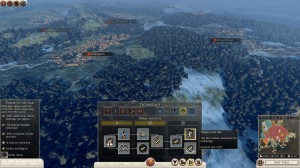
The civic tech tree. Don’t leave home without it. N.B. the bonuses to counter corruption and spread my culture. These are huge advantages for someone seeking to rapidly take over the known world.
Once I had created a powerful army and had enough food to send it overland into another province to crush their defenses and assimilate them into my nascent empire I gradually was forced to pay attention to public order. Initially you probably won’t have to worry much with public order. There is a -25 point penalty to overrunning a province, but it only lasts for one turn. Also initially you are likely to be taking over provinces with similar cultures to yours, so there aren’t many cultural penalties. But as you move away from your original lands the cultures will be different – Celts aren’t interested in Germanic culture. Correspondingly there are cultural penalties that affect public order. These diminish over time, but slowly. However, there are religious buildings which can help boost public order, and some even allow for a faster spread of your culture. On top of that, there are some cool tech advances that will also universally improve public order and speed the spread of your culture. If you intend to conquer the known world it is imperative that you research and develop this tech tree. Your growth will be significantly faster than if you neglect it.
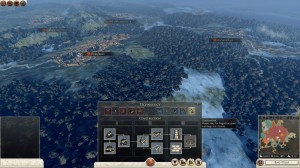
More civil tech. I value this more than military tech, and thus far it has paid off quite well. Note the level of cash and food I have as a surplus.
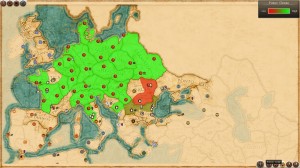
The level of happiness in my empire. Even in Thracia, which is just recently conquered, I’m doing quite well. Cultural tech has received far more emphasis than military.
Destroy to Create
So for a game that is called Total War I find that as my empire has spread most of my provinces are focused on raising crops and spreading culture/religion. A survey of some of the provinces in my empire shows that very few of my towns have any emphasis on military. The reason for that is simple: I was forced to dismantle a lot of structures that didn’t produce food or improve public order. The lesson was simple: sometimes I had to destroy existing buildings in order to stabilize the province and keep everyone fed.
.
Yes, along the way there are some wealth generating opportunities. Sometimes these were worth investing in. But I found that wealth tended to accumulate naturally if I just provided a stable, well-fed environment for my people to live in.
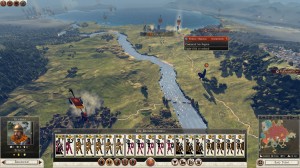
Military might should not be forgotten. Mercenaries are expensive, but I’ve got lots of cash on hand to hire as many as I need.
Rome II has many more aspects to examine, and even the few I’ve discussed here can be explored more deeply. However, I wanted to share some initial thoughts on how I managed to expand so successfully and may soon become the alternative history to Rome. The lesson from history is one that bears keeping in mind: it took more than Centurions to build an empire.
Feel free to share your feedback in our forums. There are already 90 pages of discussion on Rome II there!


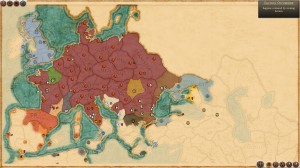
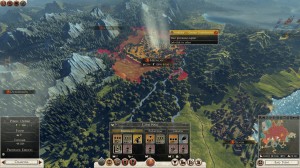
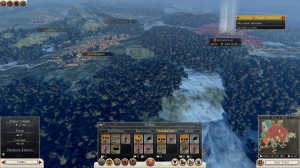
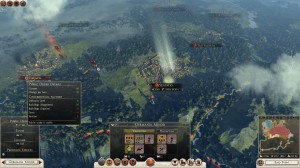

Leave a Reply